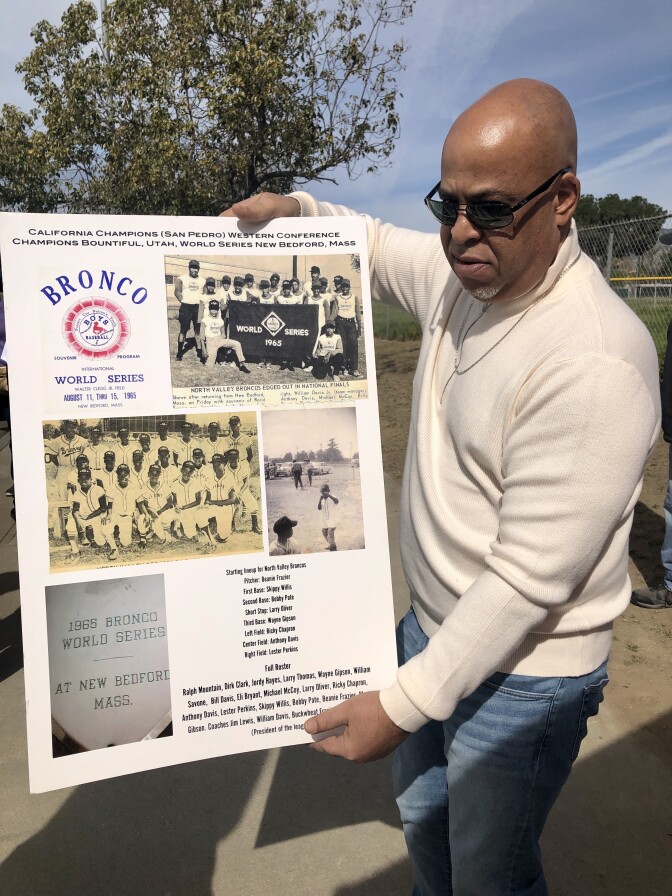This story is free to read because readers choose to support LAist. If you find value in independent local reporting, make a donation to power our newsroom today.
LA Renames Pacoima Intersection For 1965 All-Black Youth Baseball Team

A well-known intersection in Pacoima got a new name on Thursday: The North Valley Bronco Little League Team Square.
The location is home to two baseball diamonds across the street from each other, and was renamed after Southern California's first all-Black youth baseball team to reach a Little League World Series, the North Valley Broncos.
It’s a place that brims with history. Some of that history is joyful, some painful.
“[We] weren't allowed to play over there. Blacks and Hispanics couldn't play there, only whites,” said former USC and NFL running back Anthony Davis.
Discover Pacoima History
The North Valley Bronco Little League Team Square is located at Dronfield Ave. and Osborne St., in Pacoima, Calif.
Davis is a former member of the North Valley Broncos and used to practice at this intersection where the Pacoima Little League Field stands. The team reached its championship game in 1965, despite the segregation in L.A. that led to the team’s creation.
Davis and another 1965 teammate joined L.A. Councilmember Monica Rodriguez for the unveiling of the intersection’s new name.

Davis recalled when even Little League teams in Pacoima were segregated. Several Black fathers, he said, got permission to build a baseball field for their kids across the street from the segregated field.
In the mid-1960s, Pacoima was one of the few places in the San Fernando Valley where Blacks were allowed to live due to racial covenants written into real estate documents. Some of that history is documented in the new book Set The Night On Fire.
A good team underrecognized
In 1965, Davis was 12 years old and played center field and pitched for the North Valley Broncos, part of the PONY baseball league. That year the Broncos were so good they reached the Bronco League World Series in New Bedford, Massachusetts, a championship series that was lower profile than the Little League World Series, played in South Williamsport, Pennsylvania.
“It was an achievement for them that was never honored, it was only talked about among this community at that time,” said Lon Grandison, executive board member with the Pacoima Historical Society.
It was an achievement for them that was never honored, it was only talked about among this community at that time.
Besides Davis, that Broncos team included others who’d go on to national sports fame, such as Charles White, who won the Heisman Trophy, as well as Kevin Williams, who excelled nationally in the 100-yard dash.
“It was this team that not only as a result of the fortitude and insight of their parents to create an environment that allowed them to play ball,” Rodriguez said, “but this was the team that took it all the way to the World Series.”
And the designation and the sign is there for people to know about those teens and their families.

Rickie Chapron, a left fielder for the '65 Broncos who still frequents the baseball fields, described the renaming of the intersection as a dream come true.
“We didn't quit, we weren't able to play over there [and] now I'm able to coach 57 years later,” he said. Chapron now coaches the current generation of Little Leaguers where he played baseball as a kid.
He said he pushes the kids on his team to persevere, like his coaches pushed him when he was a kid.
“It's nice to honor history and to remember where we came from,” said Mika Lett, who attended the event. She made it a point to show up because Chapron coaches her 11-year-old son on these fields.
“And to think that at one point in history, he wouldn't have been allowed to play here,” said Lett, who is Black, referencing segregation. It’s inspiring, she said, to know that the kids’ fathers rolled up their sleeves and built a field when faced with that racism.








